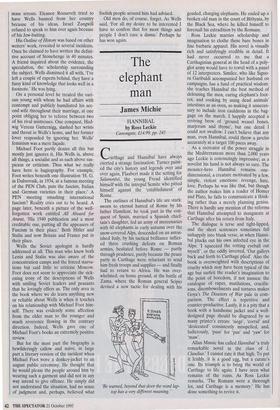The elephant man
James Michie
HANNIBAL by Ross Leckie Canongate, f14.99, pp. 245 Carthage and Hannibal have always exerted a strange fascination: Turner paint- ed the city's history and legends over and over again, Flaubert made it the setting for Salammbe , the young Freud identified himself with the intrepid Semite who pitted himself against the 'establishment' of Rome.
The outlines of Hannibal's life are stark: sworn to eternal hatred of Rome by his father Hamilcar, he took part in the con- quest of Spain, married a Spanish chief- tain's daughter, led an army of mercenaries with 60 elephants in early autumn over the snow-covered Alps, descended on an aston- ished Italy, by his tactical brilliance inflict- ed three crushing defeats on Roman armies, hesitated before Rome — partly through prudence, partly because the peace party in Carthage were reluctant to send him fresh troops and supplies — and finally had to return to Africa. He was over- whelmed, on home ground, at the battle of Zama, where the Roman general Scipio devised a new tactic for dealing with his 'Be warned, beyond that door the word lap- top has a very different meaning.' goaded, charging elephants. He ended up a broken old man in the court of Bithynia, by the Black Sea, where he killed himself to forestall his extradition by the Romans.
Ross Leckie marries scholarship and imagination to clothe these bare bones in fine barbaric apparel. His novel is visually rich and satisfyingly credible in detail. It had never occurred to me that a Carthaginian general at the head of a poly- glot army would have to travel with a panel of 12 interpreters. Similce, who like Signo- ra Garibaldi accompanied her husband on campaigns, has a fund of practical wisdom: she teaches Hannibal the best method of delousing the men, curing elephant's foot- rot, and cooking by using dead animals' intestines as an oven, so making it unneces- sary to include iron cauldrons in the bag- gage on the march. I happily accepted a reviving brew of 'ground weasel bones, marjoram and thyme', but one detail I could not swallow: I can't believe that any man, even Hannibal, could throw a javelin accurately at a target 100 paces away.
As a recreator of the power struggle in the Mediterranean more than 2,000 years ago Leckie is convincingly impressive; as a novelist his hand is not always so sure. The monster-hero Hannibal remains one- dimensional, a creature motivated by a few, simple, violent emotions: revenge, hate, love. Perhaps he was like that, but though the author makes him a reader of Homer and Plato, he fails to communicate a think- ing rather than a merely planning genius. There is hardly any mention of the reforms that Hannibal attempted to inaugurate at Carthage after his return from Italy.
The dialogue is terse and tight-lipped, and the short sentences sometimes fall unhappily into blank verse, as when Hanni- bal plucks out his own infected eye in the Alps: `I squeezed the rotting eyeball out myself', or the oddly inverted, 'Our galleys back and forth to Carthage plied'. Also the book is overweighted with descriptions of cruelty which may have been typical of the age but surfeit the reader's imagination to the point of boredom, if not nausea: the catalogue of rapes, mutilations, crucifix- ions, disembowelments and tortures makes Goya's The Disasters of War pale in com- parison. The effect is repetitive and counter-productive. Lastly, it is a pity that a book with a handsome jacket and a well- designed page should be disgraced by so many printer's errors: 'siege', 'corral' and `desiccated' consistently misspelled, and, ludicrously, 'puss' for 'pus' and 'yaw' for `maw'.
Allan Massie has called Hannibal 'a truly remarkable novel in the class of I, Claudius.' I cannot rate it that high. To put it Irishly, it is a good egg, but a curate's one. Its triumph is to bring the world of Carthage to life again. I have seen what remains of the ruins. As Ross Leckie remarks, The Romans were a thorough lot, and Carthage is a memory.' He has done something to revive it.










































































 Previous page
Previous page